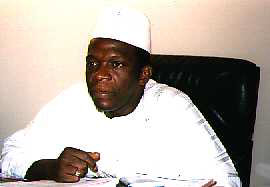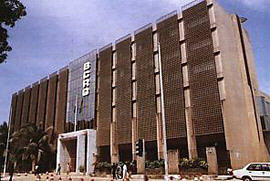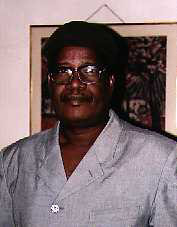 FINANCE FINANCE
 A STEADILY GROWING ECONOMY A STEADILY GROWING ECONOMY

One of the main tasks of the Minister of Economy and Finance, Mr. Ibrahima Kassory Fofana , is to create the ideal economic climate for the establishment of foreign investors in Guinea. Mr. Fofana’s strong personality, bold actions and strict budget control have contributed to clean up the financial system and set the basis for economic growth.
Guinea’s GDP growth rate has steadily increased in the past few years. It rose from 4.4% in 1995 to 4.8% in 1997. Within the program for development "Guinea Vision 2010", the level of growth is expected to reach a two digit figure. This implies a growth of income per person of approximately 1.5% per year.
The balance of payments is well on its way to being balanced. This has been possible by limiting public expenses which in turn have allowed further investment in the private sector, leading to an increase of exports. The balance of trade is now positive.
Mr. Kassory Fofana’s economic program tries to tackle the traditional black spots of the financial environment: low national savings, a fragile banking system, and a financial market still in its embryonic stage.
 PLANS FOR A STOCK EXCHANGE IN 1999 PLANS FOR A STOCK EXCHANGE IN 1999
As a means to develop the financial market, the Central Bank of Guinea (BCRG) and the World Bank have a joint plan to create an autonomous Stock Exchange by 1999. The government believes this instrument is a guarantee for investors since they will feel at ease knowing they can sell their shares at any given time. However, before it starts its operations, the accounting report system and the banking system have to be rendered more reliable.
 BANKING SYSTEM RESTRUCTURES BANKING SYSTEM RESTRUCTURES
The financial network comprises 6 commercial banks and 4 insurance companies, all of them under the control and supervision of the central bank. Two more banks have already applied for registration. The BCRG has taken strict measures to heal the ailing banking system since some of its members were under difficulties due to bad management. The restructuring and capitalization process is expected to finish in late 1998 - early 1999.

When state banks were privatized international financial holdings quickly acquired large packages of shares. BICIGUI, the largest commercial bank in Guinea -and the only one offering swift services- as well as the Société Générale des Banques belong to French financial groups. Malaysians, spurred by their increasing interests in Guinea have recently established their own bank, ICB (International Bank of Guinea), where all personnel is bilingual English-French.
|
The Banque Islamique de Guinée (BIG), the first private bank ever established in Guinea, belongs to the Dar Al Maal Al Islami Holding (Switzerland) and the Banque Islamique de Developement (Saudi Arabia). According to Mr. Benjeloun Abdel Majid, Director General of BIG, they have found their niche financing small and medium enterprises. Many of these small scale companies find serious difficulties obtaining financial means for their projects, especially for long term loans; besides, far too often interest rates are so disproportionately high (25-30%) they cannot afford to make any kind of investments. The BIG does not charge a fixed rate of interest; rather, it studies the project and the interest rate is agreed upon with the small business, always depending on the results obtained. This unusual practice follows Islamic principles which condemn usury.
The BIG, which just recently finished its restructuring process, also wants to attract large enterprises and daughter companies of multinational companies. But probably its major challenge is to attract the informal market, representing 50% of all trade carried out in Guinea. If they manage, they will doubtlessly become the biggest bank in the zone.

 INSURANCE SECTOR ALSO UNDERGOES DEEP CHANGES INSURANCE SECTOR ALSO UNDERGOES DEEP CHANGES
The insurance sector has also been affected by the organization of the financial sector. Presently there are 4 insurance companies operating in Guinea, but only UGAR (Union Guinéenne d’Assurances et de Réassurances), by far the largest and most competitive of the lot, can boast to have regularly distributed dividends among its partners since 1995. Presently UGAR covers 85% of the market, leaving the other 3 to fend for the remaining 15%.
UGAR network of 19 agencies distributed all over Guinea allows them to give coverage to businesses far detached from Conakry and in key sectors of the economy: banks, mining companies, the Autonomous Port of Conakry, civil engineering companies, etc.
The director general of UGAR, Mr. Raphaël Yomba Touré claims that his company has also benefited from business synergies and technical assistance from its French partner, the AXA group, owner of 40% of the insurance company and the second largest insurance company in the world. Today the State owns 35% of the company, having sold 25% to private investors. However, Mr. Yomba Touré believes that AXA, taking advantage of the government’s disengagement policy, will try to increase its shares to 51%. |

